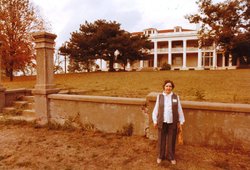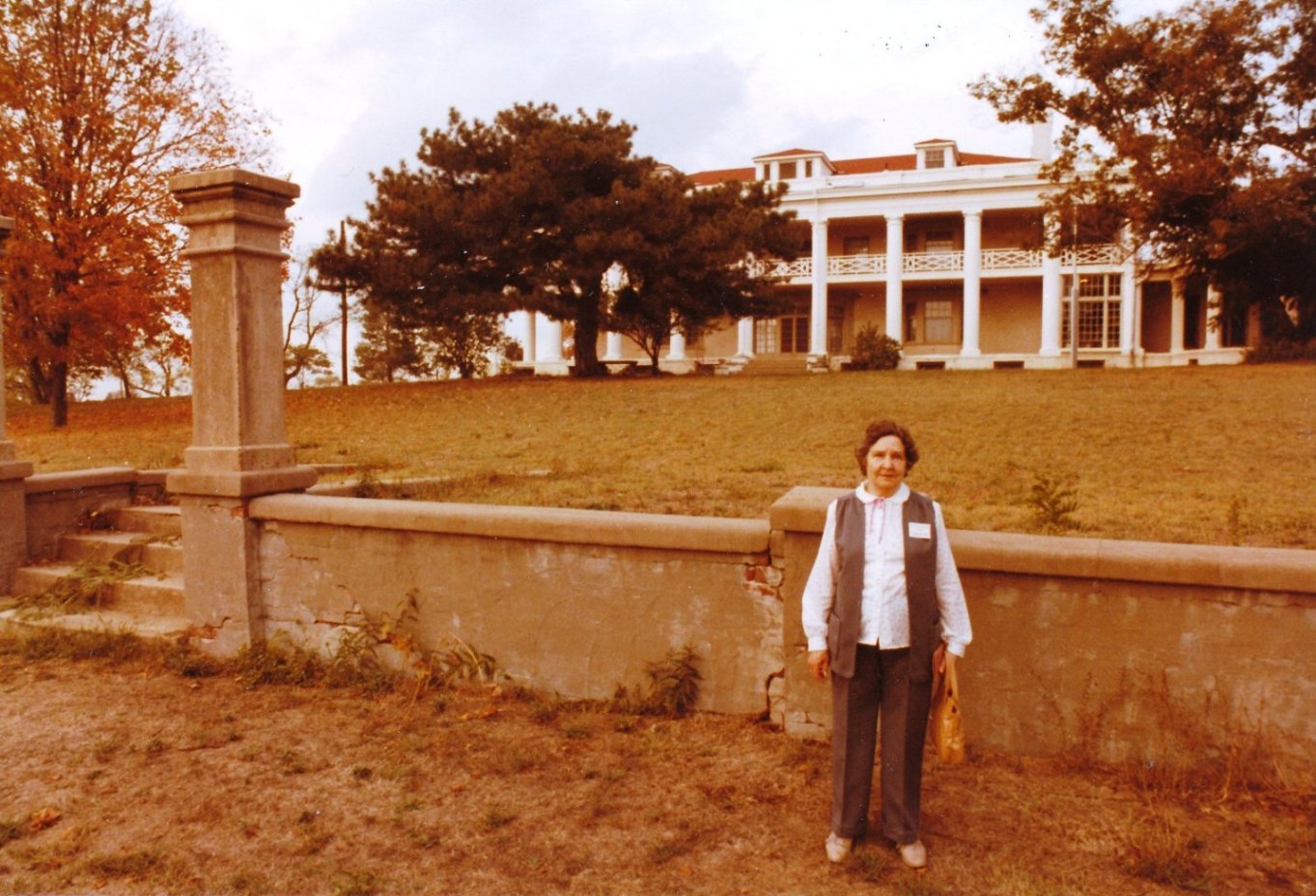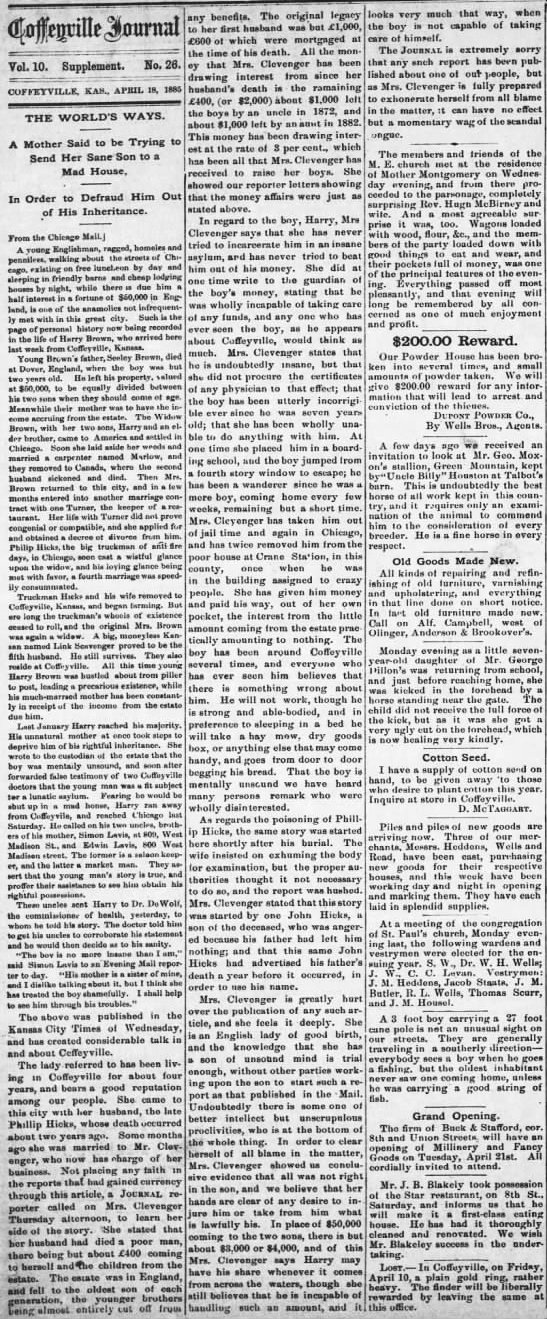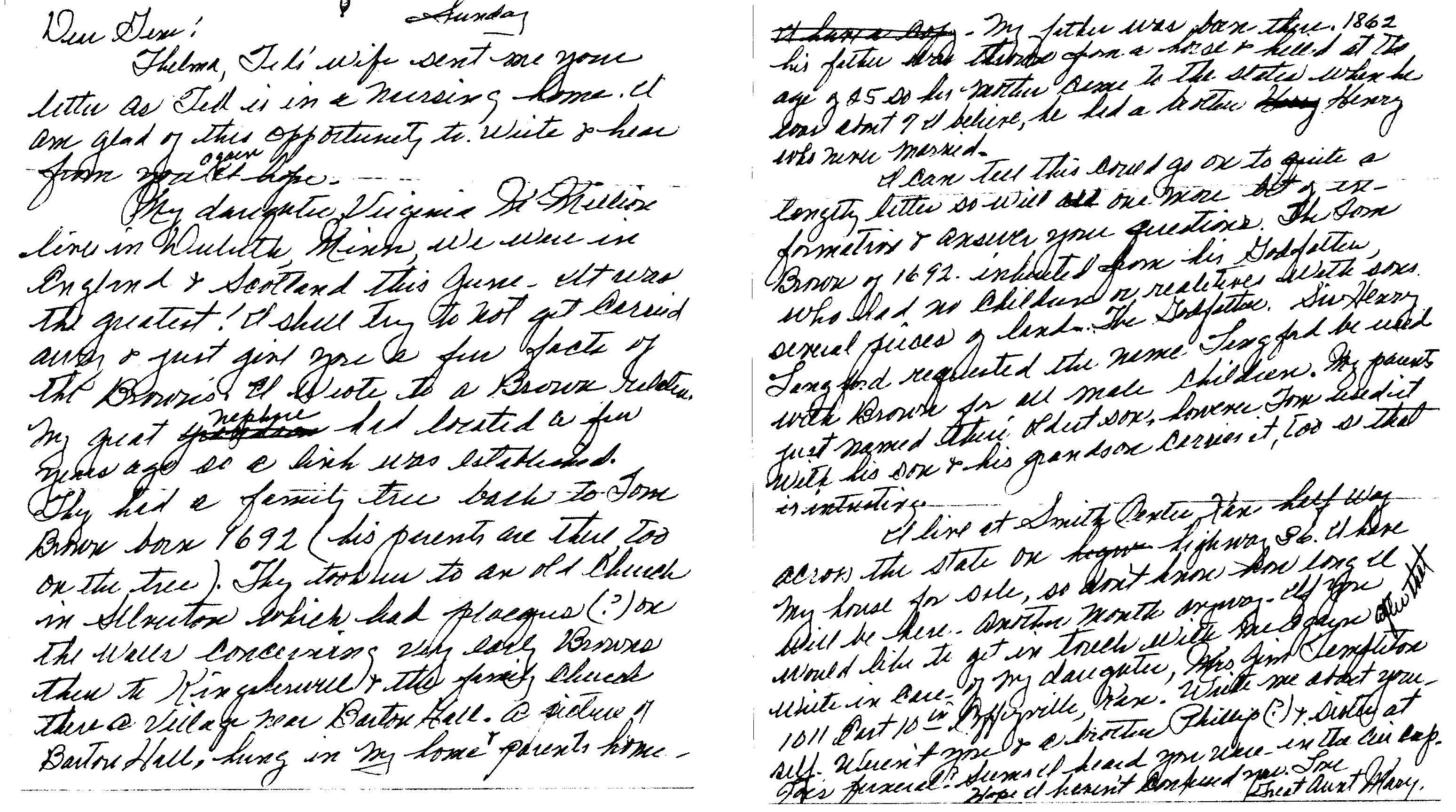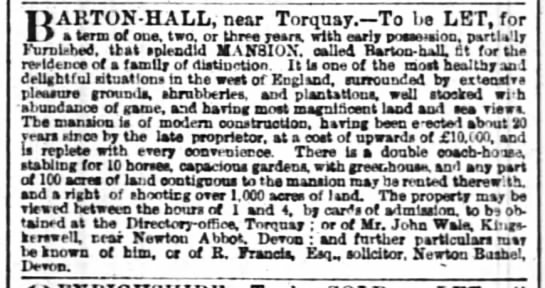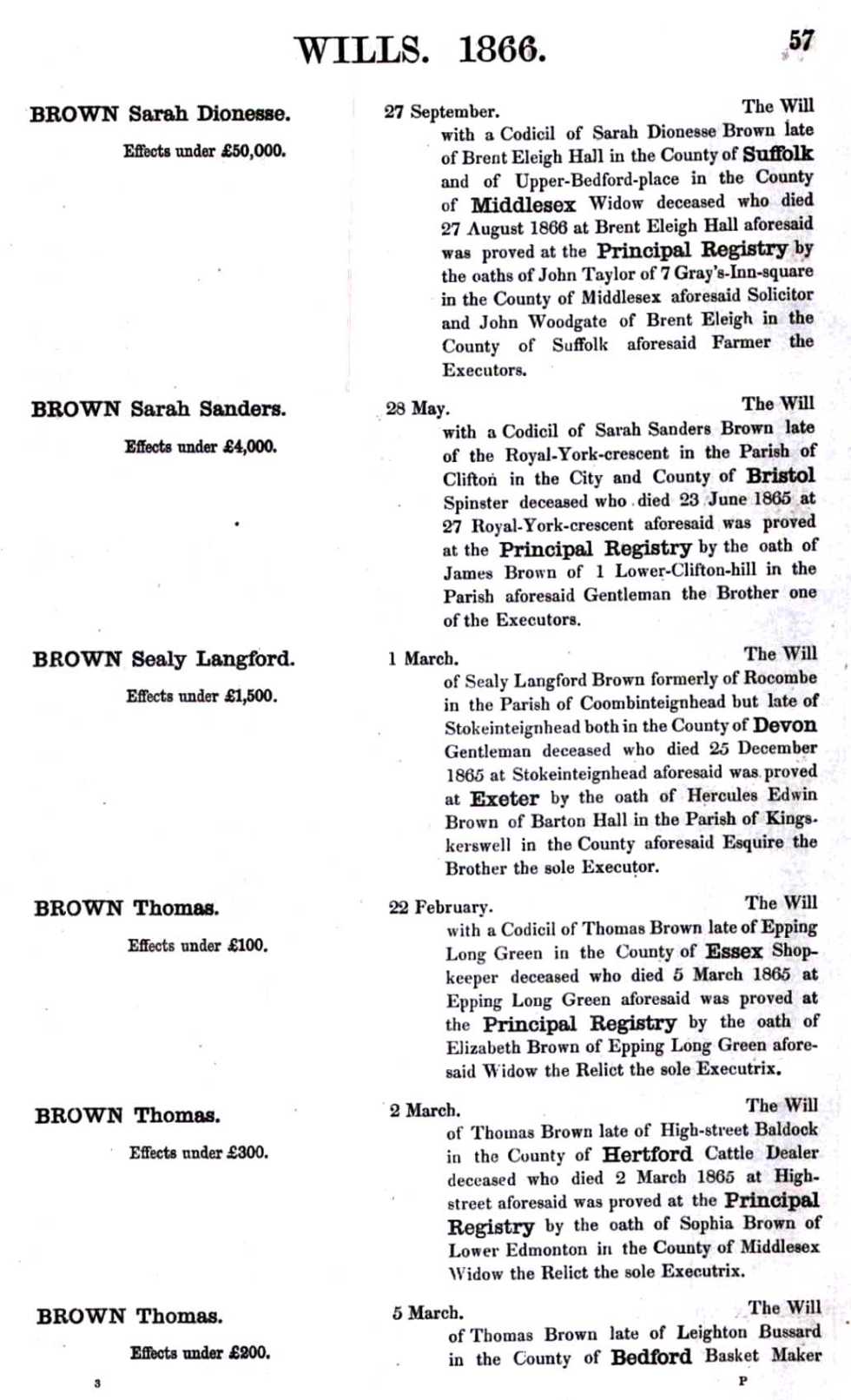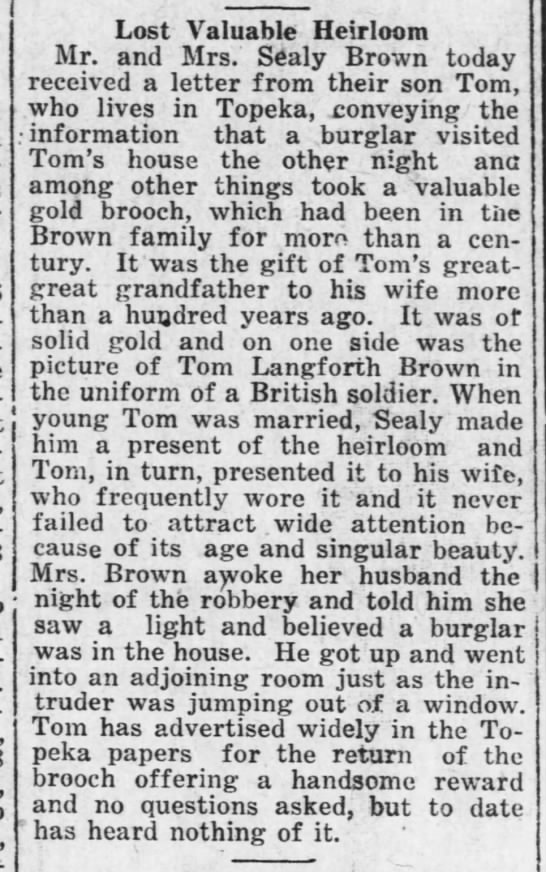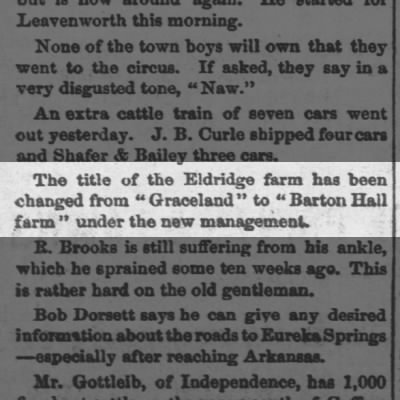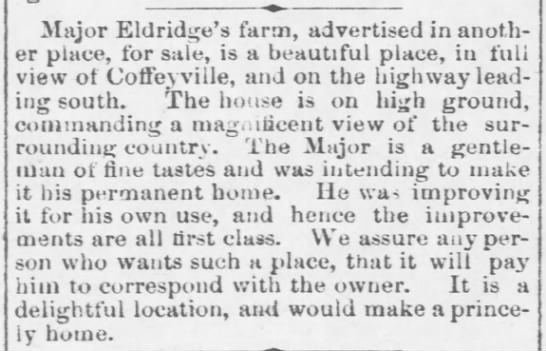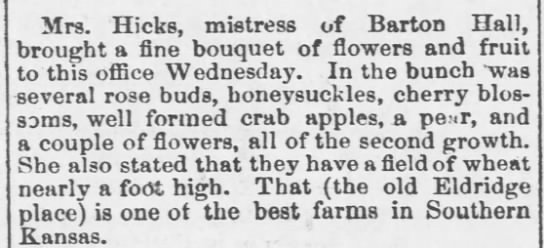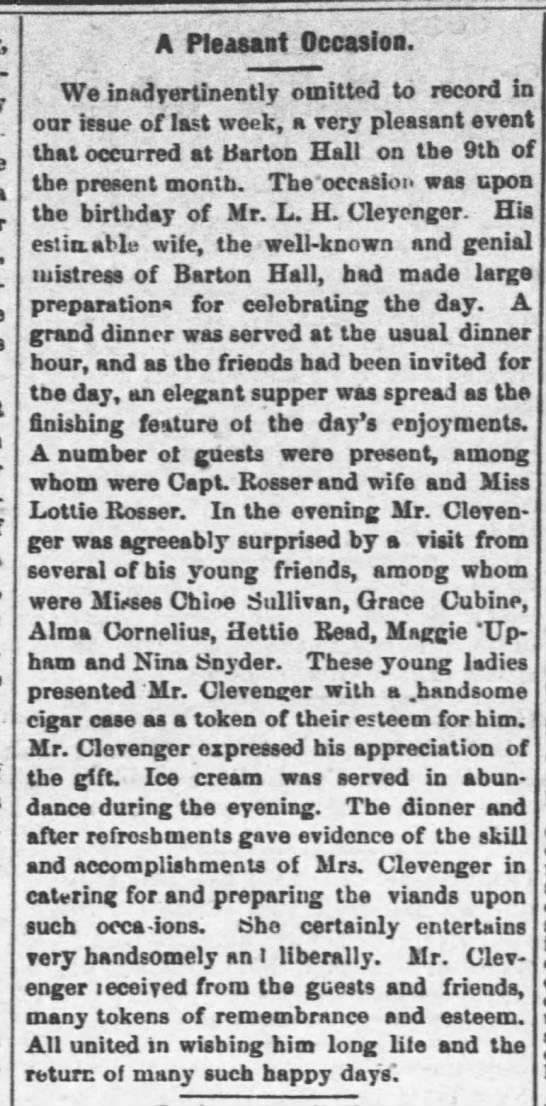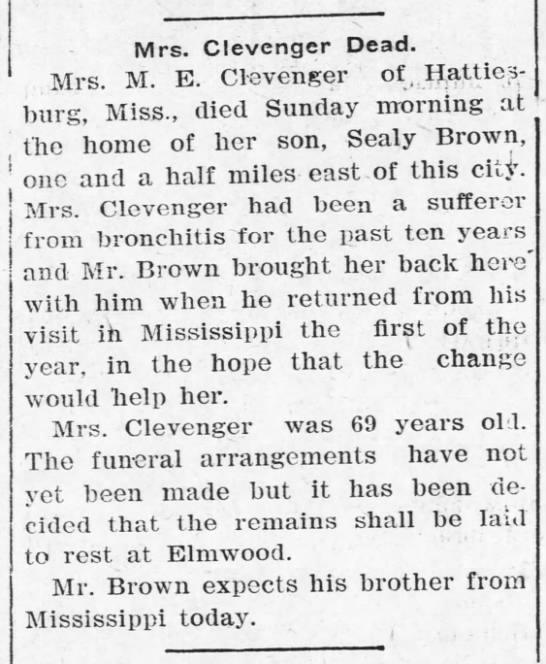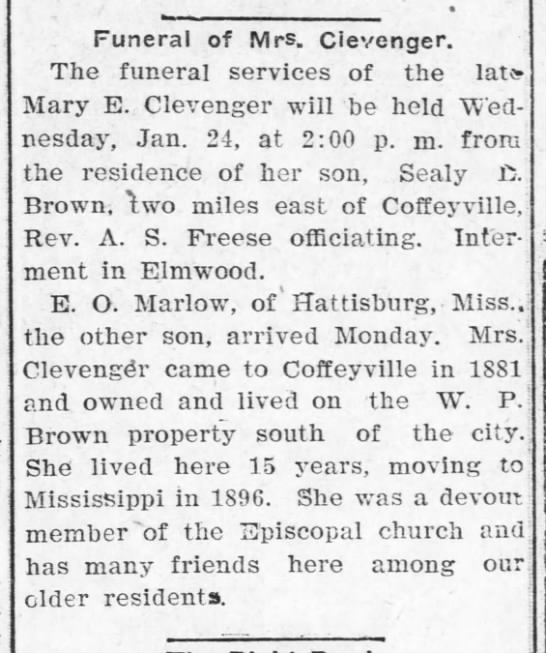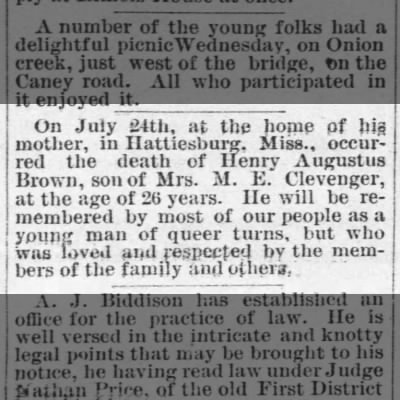First, here's the piece from The Chicago Mail:
THE WORLD'S WAYS.
A MOTHER SAID TO BE TRYING TO SEND HER SON TO A MAD HOUSE IN ORDER TO DEFRAUD HIM OUT OF HIS INHERITANCE.
A young Englishman, ragged, homeless and penniless, walking about the streets of Chicago, existing on free luncheons by day and sleeping in friendly barns and cheap lodging houses by night, while there is due him a half-interest in a fortune of $40,000 in England, is one of the anomalies not infrequently met with in this great city. Such is the page of personal history now being recorded in the life of Henry Brown, who arrived here last week from Coffeyville, Kansas.
Young Brown's father, Sealy Brown, died at Dover, England, when the boy was but two years old. He left his property, valued at $50,000, to be equally divided between his two sons when they should come of age. Meanwhile their mother was to have the income accruing from the estate. The widow Brown, with her two sons, Henry and an elder brother (correction: it was Sealy, a younger brother), came to America and settled in Chicago. Soon she laid aside her xxxx (can't make out this word) and married a carpenter named Marlow, and they moved to Canada, where the second husband sickened and died. Then Mrs. Brown returned to this city, and in a few months entered into another marriage contract with one Turner, the keeper of a restaurant. Her life with Turner did not prove congenial or compatible, and she applied for and obtained a decree of divorce from him. Philip Hicks, the big truckman of anti xxx days in Chicago, soon cast a wistful glance upon the widow, and his toying glance being met with favor, a fourth marriage was speedily consummated.
Truckman Hicks and his wife removed to Coffeyville, Kansas, and began farming. But ere long the truckman's wheels of existence ceased to roll, and the original Mrs. Brown was again a widow. A big moneyless Kansasan named Link Clevenger proved to be the fifth husband.
Last January Henry reached his majority. His unnatural mother at once took steps to deprive him of his rightful inheritance. She wrote to the custodian of the estate that the boy was mentally unsound, and soon after furnished false testimony of two Coffeyville doctors that the young man was a fit subject for a lunatic asylum. Fearing he would be shut up in a madhouse, Henry ran away from Coffeyville, and reached Chicago last Saturday. He called on his two uncles, brothers of his mother, Simon Lavis, 809 West Madison street, and Edwin Lavis, 800 West Madison Street. The former is a saloon keeper, and the latter a market man. They assert that the young man's story is true, and proffer their assistance to see him obtain his rightful possessions.
These uncles sent Henry to Dr. DeWolf, the commissioner of health, yesterday, to whom he told his story. The doctor told him to get his uncles to corroborate his statement and he would then decide as to his sanity.
"The boy is no more insane than I am," said Simon Lavis to an Evening Mail reporter today. "His mother is a sister of mine, and I dislike talking about it, but I think she has treated the boy shamefully. I shall help to see him through his troubles."
NOW, HERE IS WHAT THE COFFEYVILLE JOURNAL HAD TO SAY:
The above was published in the Kansas City Times of Wednesday, and has created considerable talk in and about Coffeyville.
"The lady referred to has been living in Coffeyville for about four years, and bears a good reputation among our people. She came to this city with her husband, the late Philip Hicks, whose death occurred about two years ago. Some months ago she was married to Mr. Clevenger, who now has charge of her business. Not placing any faith in the reports that had gained currency through this article, a Journal reporter called on Mrs. Clevenger Thursday afternoon, to learn her side of the story. She stated that her husband had died a poor man, there being but about £400 coming to herself and the children from the estate. The estate was in England, and fell to the oldest son of each generation, the younger brothers were entirely cut off from any benefits. The original legacy to her first husband was but £1,000, £600 of which were mortgaged at the time of his death. All the money that Mrs. Clevenger has been drawing interest from since her husband's death is the remaining £400, (or $2,000) about $1,000 left the boys by an uncle in 1872, and about $1,000 left by an aunt in 1882. This money has been drawing interest at the rate of 3 per cent, which has been all that Mrs. Clevenger has received to raise her boys. She showed our reporter letters showing that the money affairs were just as stated above.
In regard to the boy, Henry, Mrs. Clevenger says that she has never tried to incarcerate him in an insane asylum, and has never tried to beat him out of his money. She did at one time write to the guardian of the boy's money, stating that he was wholly incapable of taking care of any funds, and any one who has ever seen the boy, as he appears about Coffeyville, would think as much. Mrs. Clevenger states that he is undoubtedly insane, but that she did not procure the certificates of any physician to that effect; that the boy has been utterly incorrigible ever since he was seven years old; that she has been wholly unable to do anything with him. At one time she placed him in a boarding school, and the boy jumped from a fourth story window to escape; he has been a wanderer since he was a mere boy, coming home every few weeks, remaining but a short time. Mrs. Clevenger has taken him out of jail time and again in Chicago, and has twice removed him from the poor house at Crane Station, in this county, once when he was in the building assigned to crazy people. She has given him money and paid his way, out of her own pocket, the interest from the little amount coming from the estate practically amounting to nothing. The boy has been around Coffeyville several times, and everyone who has ever seen him believes that there is something wrong about him. He will not work, though he is strong and able-bodied, and in preference to sleeping in a bed he will take a hay mow, dry goods box, or anything else that may come handy, and goes from door to door begging his bread. That the boy is mentally unsound we have heard many persons remark who were wholly disinterested.
As regards the poisoning of Phillip Hicks, the same story was started here shortly after his burial. The wife insisted on exhuming the body for examination, but the proper authorities thought it not necessary to do so, and the report was hushed. Mrs. Clevenger stated that this story was started by one John Hicks, a son of the deceased, who was angered because his father had left him nothing; and that this same John Hicks had advertised his father's death a year before it occurred, in order to use his name.
Mrs. Clevenger is greatly hurt over the publication of any such article, and she feels it deeply. She is an English lady of good birth, and the knowledge that she has a son of unsound mind is trial enough, without other parties working upon the son to start such a report as that published in the Mail. Undoubtedly there is someone of better intellect but unscrupulous proclivities, who is at the bottom of the whole thing. In order to clear herself of all blame in the matter, Mrs. Clevenger showed us conclusive evidence that all was not right in the son, and we believe that her hands are clear of any desire to injure him or take from him what is lawfully his. In place of $50,000 coming to the two sons, there is but about $3,000 or $4,000, and of this Mrs. Clevenger says Harry may have his share whenever it comes from across the waters, though she still believes that he is incapable of handling such an amount, and it looks very much that way, when the boy is not capable of taking care of himself.
The Journal is extremely sorry that any such report has been published about one of our people, but as Mrs. Clevenger is fully prepared to exonerate herself from all blame in the matter, it can have no effect but a momentary wag of the scandal tongue.
////////////////
So, the Coffeyville Journal confirms that Mary was indeed who she claimed to be. She had indeed been married to Sealy Brown of Barton Hall, England, and he was the father of her first 2 children, Henry Brown and Sealy Brown."
Henry Augustus Brown died at at his mother's home in Hattiesburg Mississippi in 1889 at age 26.
Here is a link to the grave of Mary's grandaughter, Mary Brown Stumbaugh, where you will find a 2-page letter she wrote concerning her trip to England and what she knew about the Brown family.
Although Mary did have five husbands over the years, it seems that she was merely a woman trying to make her way in a man's world. I have found nothing to indicate any impropriety. She was loved by her family and we cherish her memory. - Eugene R. Walthall
First, here's the piece from The Chicago Mail:
THE WORLD'S WAYS.
A MOTHER SAID TO BE TRYING TO SEND HER SON TO A MAD HOUSE IN ORDER TO DEFRAUD HIM OUT OF HIS INHERITANCE.
A young Englishman, ragged, homeless and penniless, walking about the streets of Chicago, existing on free luncheons by day and sleeping in friendly barns and cheap lodging houses by night, while there is due him a half-interest in a fortune of $40,000 in England, is one of the anomalies not infrequently met with in this great city. Such is the page of personal history now being recorded in the life of Henry Brown, who arrived here last week from Coffeyville, Kansas.
Young Brown's father, Sealy Brown, died at Dover, England, when the boy was but two years old. He left his property, valued at $50,000, to be equally divided between his two sons when they should come of age. Meanwhile their mother was to have the income accruing from the estate. The widow Brown, with her two sons, Henry and an elder brother (correction: it was Sealy, a younger brother), came to America and settled in Chicago. Soon she laid aside her xxxx (can't make out this word) and married a carpenter named Marlow, and they moved to Canada, where the second husband sickened and died. Then Mrs. Brown returned to this city, and in a few months entered into another marriage contract with one Turner, the keeper of a restaurant. Her life with Turner did not prove congenial or compatible, and she applied for and obtained a decree of divorce from him. Philip Hicks, the big truckman of anti xxx days in Chicago, soon cast a wistful glance upon the widow, and his toying glance being met with favor, a fourth marriage was speedily consummated.
Truckman Hicks and his wife removed to Coffeyville, Kansas, and began farming. But ere long the truckman's wheels of existence ceased to roll, and the original Mrs. Brown was again a widow. A big moneyless Kansasan named Link Clevenger proved to be the fifth husband.
Last January Henry reached his majority. His unnatural mother at once took steps to deprive him of his rightful inheritance. She wrote to the custodian of the estate that the boy was mentally unsound, and soon after furnished false testimony of two Coffeyville doctors that the young man was a fit subject for a lunatic asylum. Fearing he would be shut up in a madhouse, Henry ran away from Coffeyville, and reached Chicago last Saturday. He called on his two uncles, brothers of his mother, Simon Lavis, 809 West Madison street, and Edwin Lavis, 800 West Madison Street. The former is a saloon keeper, and the latter a market man. They assert that the young man's story is true, and proffer their assistance to see him obtain his rightful possessions.
These uncles sent Henry to Dr. DeWolf, the commissioner of health, yesterday, to whom he told his story. The doctor told him to get his uncles to corroborate his statement and he would then decide as to his sanity.
"The boy is no more insane than I am," said Simon Lavis to an Evening Mail reporter today. "His mother is a sister of mine, and I dislike talking about it, but I think she has treated the boy shamefully. I shall help to see him through his troubles."
NOW, HERE IS WHAT THE COFFEYVILLE JOURNAL HAD TO SAY:
The above was published in the Kansas City Times of Wednesday, and has created considerable talk in and about Coffeyville.
"The lady referred to has been living in Coffeyville for about four years, and bears a good reputation among our people. She came to this city with her husband, the late Philip Hicks, whose death occurred about two years ago. Some months ago she was married to Mr. Clevenger, who now has charge of her business. Not placing any faith in the reports that had gained currency through this article, a Journal reporter called on Mrs. Clevenger Thursday afternoon, to learn her side of the story. She stated that her husband had died a poor man, there being but about £400 coming to herself and the children from the estate. The estate was in England, and fell to the oldest son of each generation, the younger brothers were entirely cut off from any benefits. The original legacy to her first husband was but £1,000, £600 of which were mortgaged at the time of his death. All the money that Mrs. Clevenger has been drawing interest from since her husband's death is the remaining £400, (or $2,000) about $1,000 left the boys by an uncle in 1872, and about $1,000 left by an aunt in 1882. This money has been drawing interest at the rate of 3 per cent, which has been all that Mrs. Clevenger has received to raise her boys. She showed our reporter letters showing that the money affairs were just as stated above.
In regard to the boy, Henry, Mrs. Clevenger says that she has never tried to incarcerate him in an insane asylum, and has never tried to beat him out of his money. She did at one time write to the guardian of the boy's money, stating that he was wholly incapable of taking care of any funds, and any one who has ever seen the boy, as he appears about Coffeyville, would think as much. Mrs. Clevenger states that he is undoubtedly insane, but that she did not procure the certificates of any physician to that effect; that the boy has been utterly incorrigible ever since he was seven years old; that she has been wholly unable to do anything with him. At one time she placed him in a boarding school, and the boy jumped from a fourth story window to escape; he has been a wanderer since he was a mere boy, coming home every few weeks, remaining but a short time. Mrs. Clevenger has taken him out of jail time and again in Chicago, and has twice removed him from the poor house at Crane Station, in this county, once when he was in the building assigned to crazy people. She has given him money and paid his way, out of her own pocket, the interest from the little amount coming from the estate practically amounting to nothing. The boy has been around Coffeyville several times, and everyone who has ever seen him believes that there is something wrong about him. He will not work, though he is strong and able-bodied, and in preference to sleeping in a bed he will take a hay mow, dry goods box, or anything else that may come handy, and goes from door to door begging his bread. That the boy is mentally unsound we have heard many persons remark who were wholly disinterested.
As regards the poisoning of Phillip Hicks, the same story was started here shortly after his burial. The wife insisted on exhuming the body for examination, but the proper authorities thought it not necessary to do so, and the report was hushed. Mrs. Clevenger stated that this story was started by one John Hicks, a son of the deceased, who was angered because his father had left him nothing; and that this same John Hicks had advertised his father's death a year before it occurred, in order to use his name.
Mrs. Clevenger is greatly hurt over the publication of any such article, and she feels it deeply. She is an English lady of good birth, and the knowledge that she has a son of unsound mind is trial enough, without other parties working upon the son to start such a report as that published in the Mail. Undoubtedly there is someone of better intellect but unscrupulous proclivities, who is at the bottom of the whole thing. In order to clear herself of all blame in the matter, Mrs. Clevenger showed us conclusive evidence that all was not right in the son, and we believe that her hands are clear of any desire to injure him or take from him what is lawfully his. In place of $50,000 coming to the two sons, there is but about $3,000 or $4,000, and of this Mrs. Clevenger says Harry may have his share whenever it comes from across the waters, though she still believes that he is incapable of handling such an amount, and it looks very much that way, when the boy is not capable of taking care of himself.
The Journal is extremely sorry that any such report has been published about one of our people, but as Mrs. Clevenger is fully prepared to exonerate herself from all blame in the matter, it can have no effect but a momentary wag of the scandal tongue.
////////////////
So, the Coffeyville Journal confirms that Mary was indeed who she claimed to be. She had indeed been married to Sealy Brown of Barton Hall, England, and he was the father of her first 2 children, Henry Brown and Sealy Brown."
Henry Augustus Brown died at at his mother's home in Hattiesburg Mississippi in 1889 at age 26.
Here is a link to the grave of Mary's grandaughter, Mary Brown Stumbaugh, where you will find a 2-page letter she wrote concerning her trip to England and what she knew about the Brown family.
Although Mary did have five husbands over the years, it seems that she was merely a woman trying to make her way in a man's world. I have found nothing to indicate any impropriety. She was loved by her family and we cherish her memory. - Eugene R. Walthall
Inscription
Mary and Philip share the same stone. On Mary's side it reads:
Mary E. wife of
Philip Hicks
1837-1906
As a young child, I recollect being in this cemetery with my mother and my grandmother Brown. They lingered at this monument for a considerable time discussing things of which I then neither knew nor cared. - ERW
